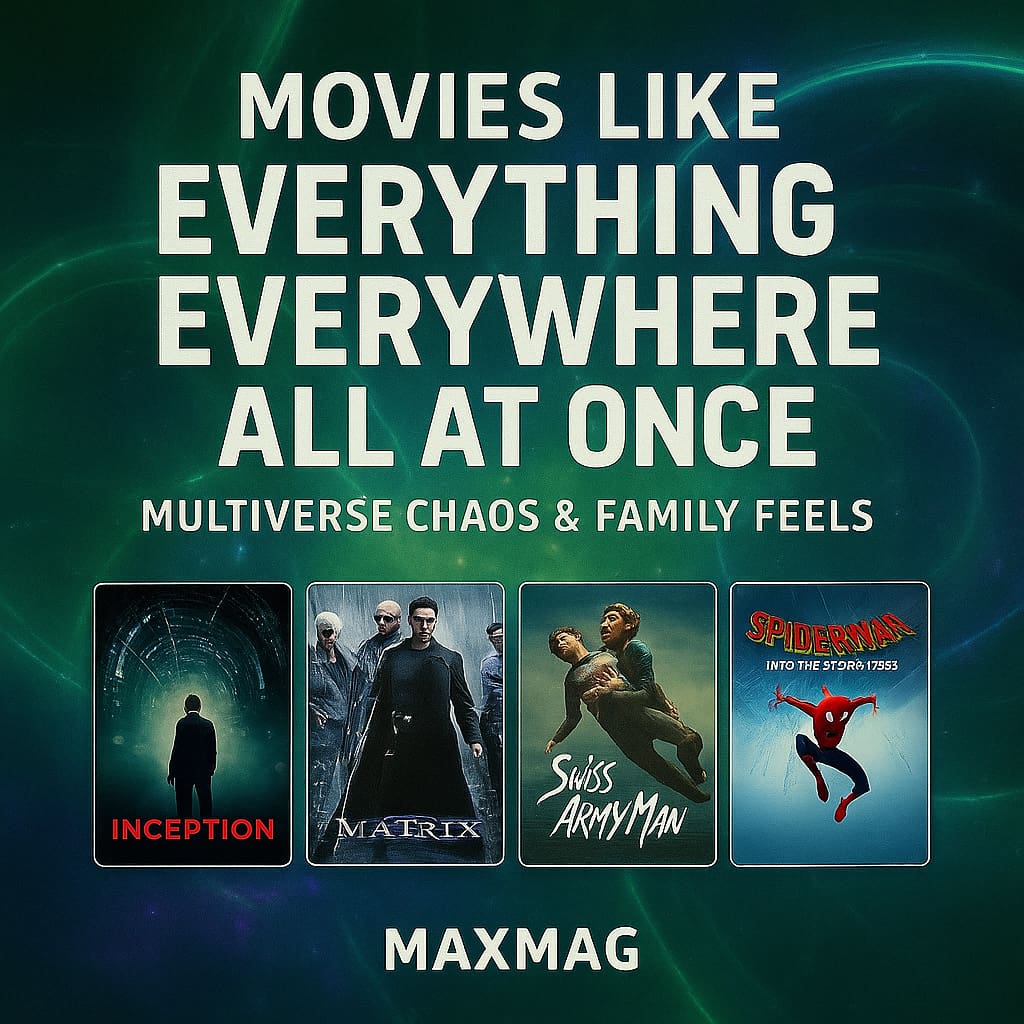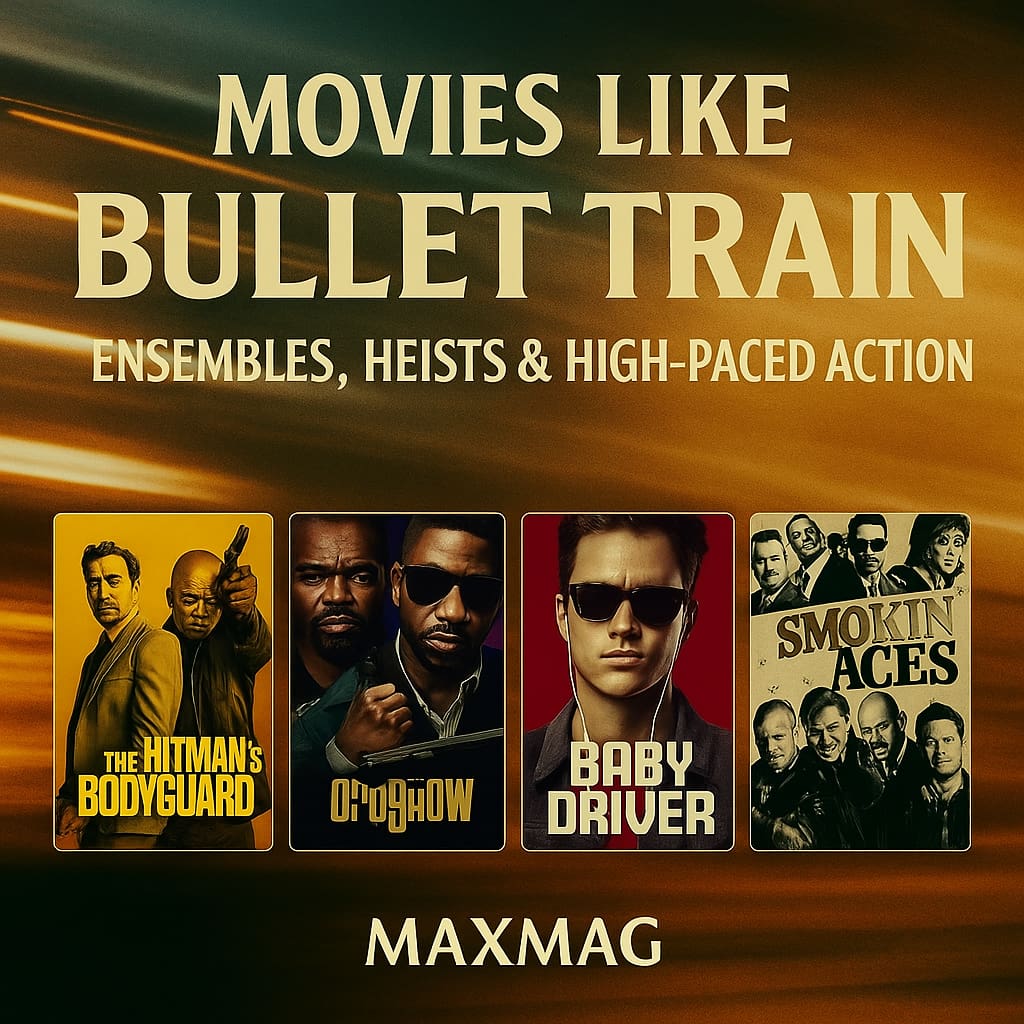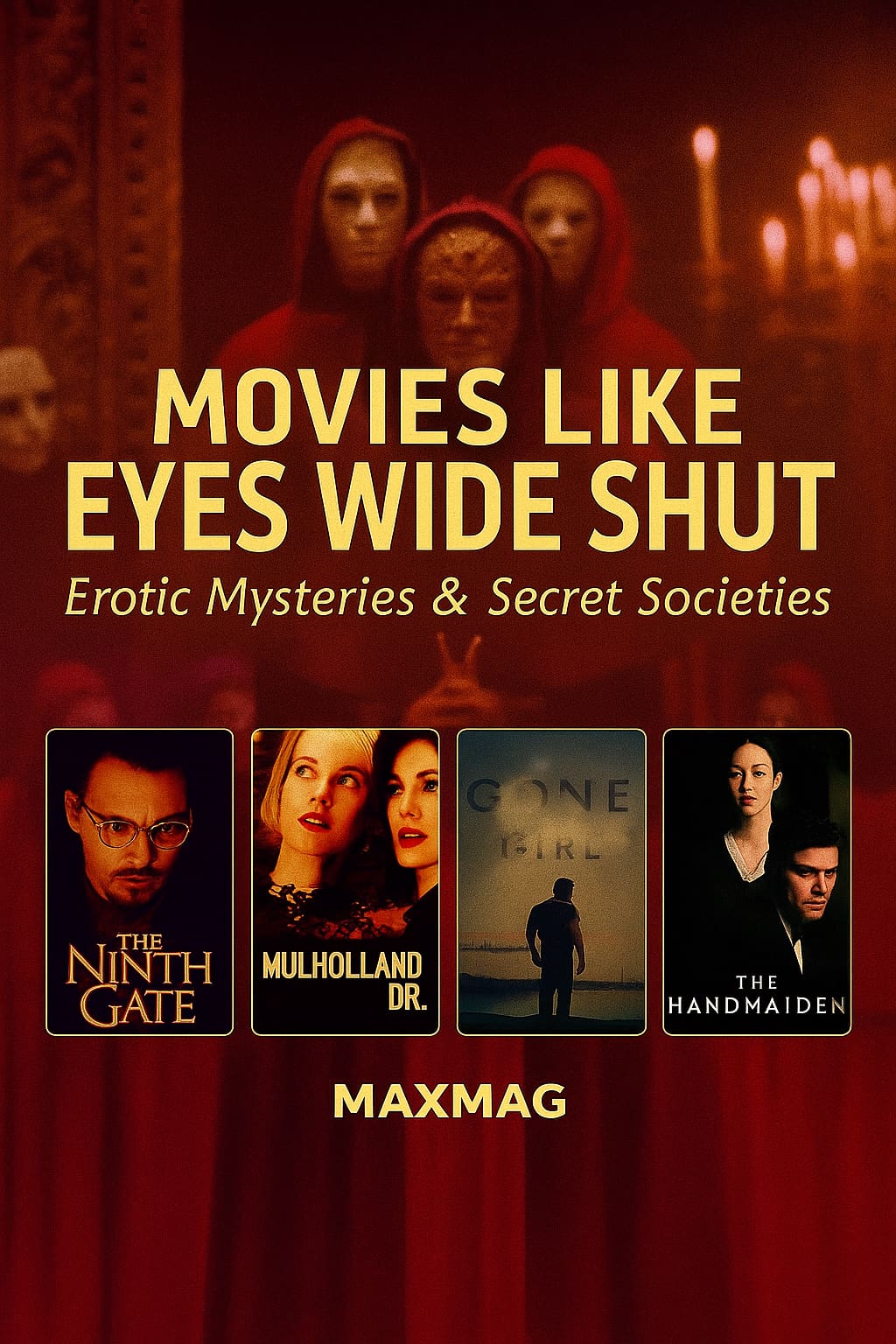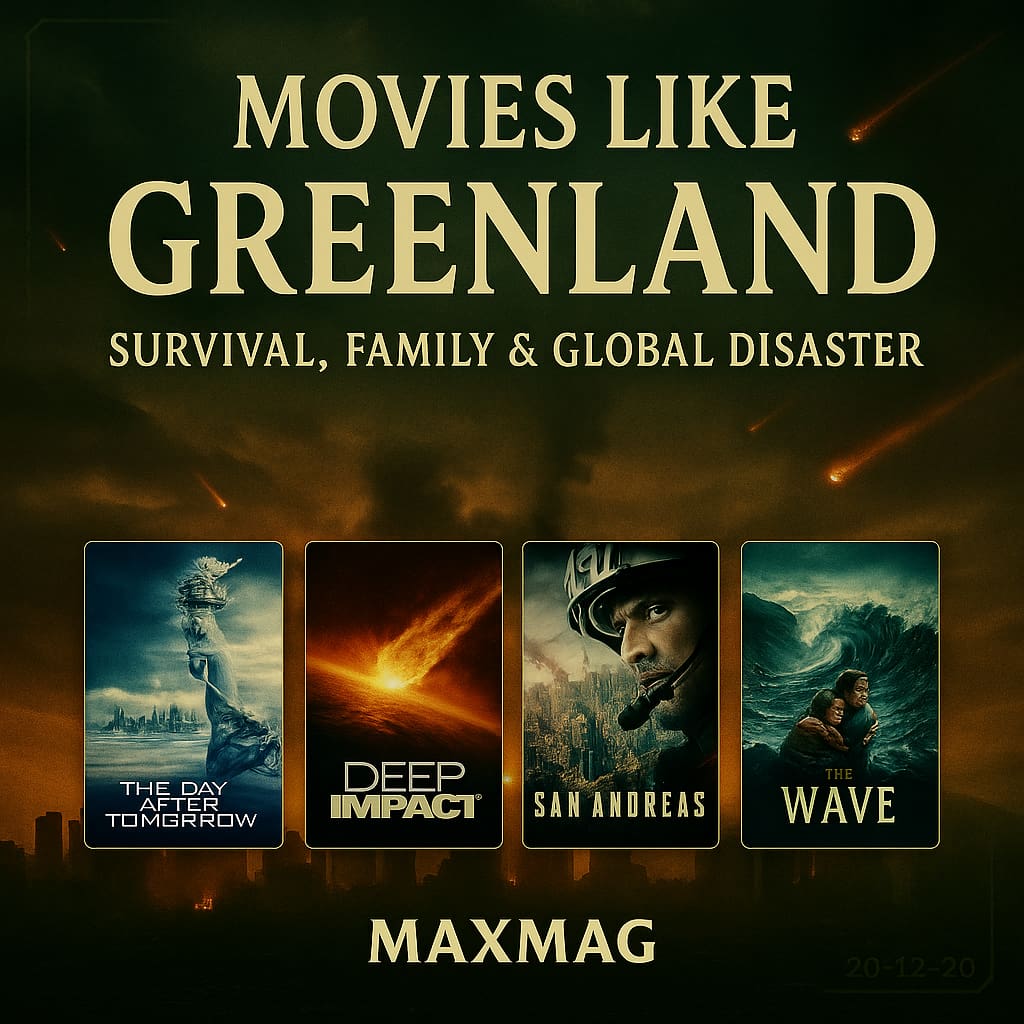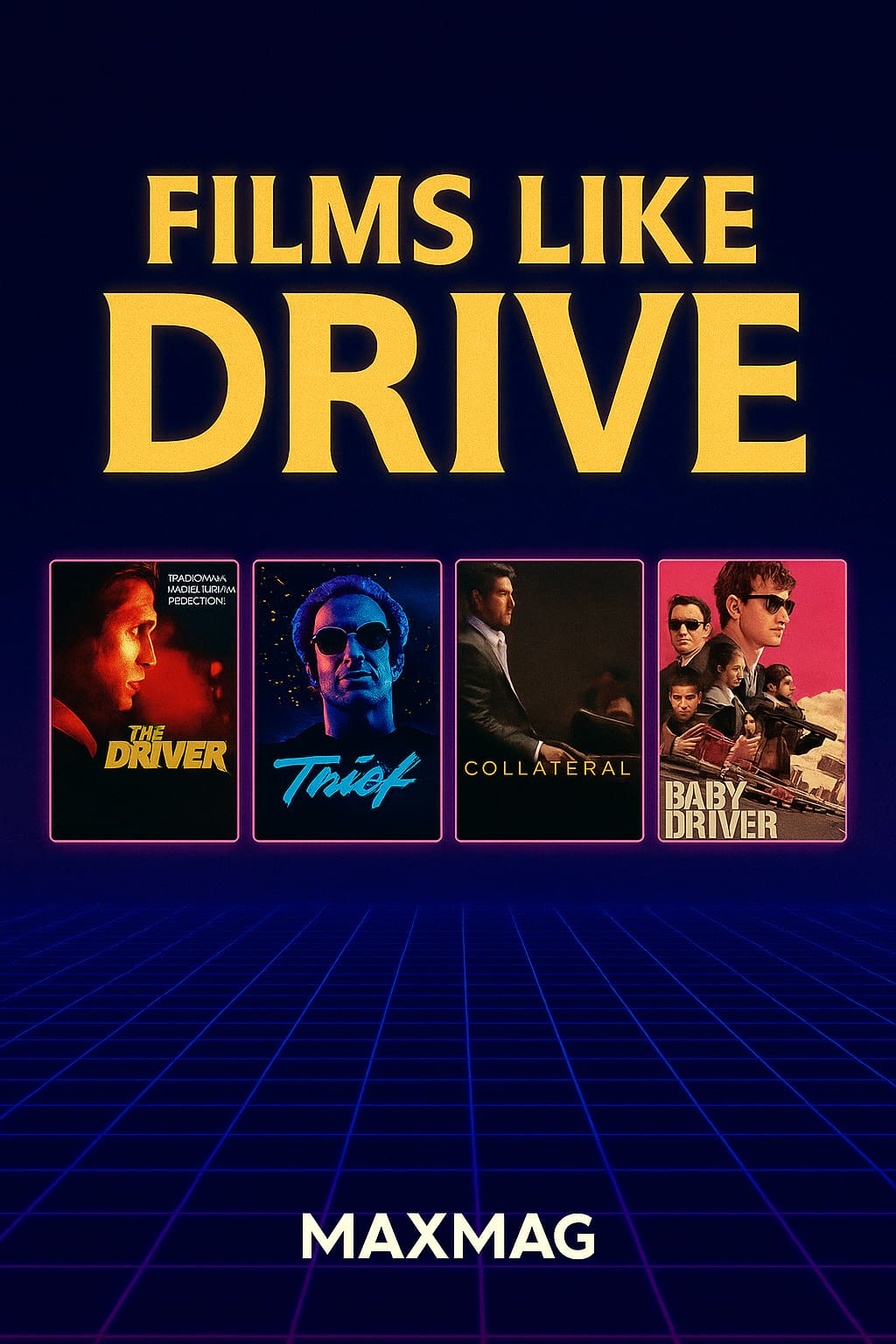
In Nicolas Winding Refn’s L.A. fable about a nameless wheelman, movies like Drive surface after the fifth word because the seed is a neon-noir crime romance that runs on silence, restraint, and sudden eruptions of violence. The story engine is a low-key getaway thriller that pivots on a heist gone sideways, intimate neighbourly bonds, and the iron code of a stoic antihero who communicates more with looks than speech, punctuated by synth-streaked night rides and elevator-burst brutality.
To define meaningful similarity, this guide weighs how each candidate mirrors Drive’s slow-burn thriller tempo, urban crime drama pressure, romantic melancholy undertow, and precise heist mechanics while sustaining personal stakes between loners, lovers, and predators. We favour films that deliver crisp night-city texture, meticulous getaway choreography, and existential pulp moods over mere car-count spectacle, then balance eras and regions so the list feels varied yet true.
Tone (neon-noir cool to feverish grit) • Narrative engine (getaway/heist pursuit) • Themes (codes, guilt, doomed romance) • Character dynamics (stoic driver vs vulnerable ally vs predator) • Stakes (personal loyalty escalating to lethal risk).
We also ensure an era & region mix so you’re not getting the same city twice while staying strictly aligned with Drive’s DNA.
Looking for precise vibes? Here are the best picks that truly feel like movies like Drive
1) The Driver (1978)
Walter Hill’s cult classic is the ur-text behind Refn’s modern fairytale. A nameless getaway specialist accepts precision jobs that turn downtown into a chessboard of angles and lights. The tone is cool, clipped, and mechanical, a synthwave vibe before the synths. His impassive code and the wary, near-wordless bond with an enigmatic woman map cleanly to Drive’s guarded tenderness. The city becomes an abstract arcade of garages, alleys, and reflections that echo Driver’s Los Angeles. Payoffs hinge on competence, timing, and the brittle trust between professionals under pressure. Fans of movies like Drive will recognise the blueprint in every gear change. Hill’s lean geometry still hums.
2) Le Samouraï (1967)
Melville’s icy hitman film is Drive’s spiritual ancestor. Jef Costello glides through Paris like a ghost following self-made commandments. The pacing is meditative, a slow-burn thriller that spikes when the net tightens. His solitary honour code and chaste connection to a witness mirror the driver’s protective distance. Metro lines, rain-slick streets, and pale interiors create a monkish world of duty and doom. The emotional hit comes from honour colliding with inevitability rather than melodrama. Viewers chasing movies like Drive will find the archetype fully formed. Melville’s silence says everything.
3) Thief (1981)
Mann’s debut marries blue-collar precision to criminal transcendence. Safecracker Frank wants a straight life yet keeps cutting steel for one last payday. The mood glows with sodium light and electronic hum, pure neon-noir urban crime drama. His fragile domestic hopes and protective instincts reflect the driver’s wordless longing. Chicago’s rain-dotted glass and machine shops form a ritual space where work equals identity. The payoff turns on pride, betrayal, and a scorched-earth code of self-reliance. Anyone hunting movies like Drive will feel the lineage in every spark. Mann’s craftsmanship bites hard.
4) Collateral (2004)
Mann returns to nocturnal Los Angeles with digital sheen and fatalism. A cabbie is forced to chauffeur a contract killer through a five-stop nightmare. The tone is sleek and clinical yet pulsing with dread. Their dueling philosophies echo Drive’s collision of protector and predator. Silvered towers, empty freeways, and coyote-haunted streets turn the city into a living organism. The catharsis comes from a civilian finding a backbone under impossible pressure. If you crave movies like Drive that stretch a single night to infinity, start here. It’s ruthless and strangely tender.
5) Heat (1995)
Mann’s magnum opus builds a whole city out of competing obsessions. Neil and Vincent orbit each other with mutual respect and terrible clarity. The pacing alternates quiet surveillance with shockwave set pieces. Its code-bound men and fragile relationships track closely to Drive’s moral hydraulics. Steel-blue vistas, diners, and airfields give Los Angeles a mythic map. Emotion peaks when duty crushes intimacy and the runway lights finally blink. Fans of movies like Drive who want maximal scope without losing intimacy will feast. Few films balance heat and hush this well.
6) The Place Beyond the Pines (2012)
Cianfrance splits a sprawling tale into fateful handoffs. A stunt rider turns to robbery to provide for a new family. The tone is mournful and dirt-under-nails, an existential pulp lullaby. His protective instincts and taciturn warmth mirror Drive’s fragile tenderness. Upstate towns, county fairs, and scrub forests replace freeways yet keep the outlaw hush. The emotional crest arrives as sins echo into sons and friendships curdle. If movies like Drive mean aching masculinity under fluorescent light, this fits. It leaves bruises that bloom later.
7) Good Time (2017)
The Safdies trap you in a jittering pinball machine. A small-time crook races through Queens to save his brother after a botched robbery. The tempo is breathless but the beats land with raw consequence. The desperate devotion and improvised schemes rhyme with Drive’s protect-and-destroy arc. Malls, hospitals, and carnival glow turn the night into a fever maze. Payoff comes as morality seeps in through exhaustion and consequence. Seekers of movies like Drive who enjoy white-knuckle momentum will lock in. It’s empathy at 3 a.m.
8) Baby Driver (2017)
Wright choreographs motion like a jukebox ballet. A prodigy wheelman tries to buy freedom one track at a time. The tone is playful yet edged, a candy-coloured cousin to Drive’s cool. His awkward sweetness and fierce protectiveness echo the driver’s guarded heart. Atlanta’s interchanges and diners replace L.A. but keep the myth of the road. Catharsis fuses brake squeal with a love song rather than a scream. For movies like Drive that skew brighter without losing craft, this sings. It’s grace on asphalt.
Break A — A grimmer alley of movies like Drive where codes meet consequences
9) Only God Forgives (2013)
Refn strips language to a bruise and lets colour talk. A shame-strangled son stalks Bangkok’s underworld under a domineering mother’s gaze. The mood is glacial and incantatory, extremity replacing chase mechanics. The protagonist’s clenched code and weaponised tenderness deform Drive’s romance into nightmare. Neon hallways, boxing rings, and karaoke stages become temples of punishment. The payoff is purification by pain rather than escape. Viewers craving movies like Drive but willing to go colder will find a mirror. It stares back unblinking.
10) Nightcrawler (2014)
Gilroy transforms Los Angeles into a marketplace for fear. A hustler with a shark’s smile sells blood to morning shows. The pacing is taut and clinical with crescendos of vehicular menace. His transactional relationships invert Drive’s protective bonds into exploitation. Freeways, police scanners, and glassy offices frame ambition as surveillance. Emotional release curdles into triumph that feels like rot. Those seeking movies like Drive that examine predators behind the wheel should stop here. It’s charming like a knife.
11) To Live and Die in L.A. (1985)
Friedkin swaps night neon for carcinogenic daylight. A Secret Service agent pursues a counterfeiter with suicidal focus. The tone is abrasive, nihilistic, and momentum-drunk. Its obsessive men and transactional loyalties rhyme with Drive’s code collisions. Bridges, drainage channels, and wrong-way freeways paint a harsh civic labyrinth. The release is cruel, earned, and almost anti-heroic. Fans of movies like Drive who want sharper edges will relish this burn. It leaves skid marks on the soul.
12) Blue Ruin (2013)
Saulnier’s revenge tale starts with a man living in a car and ends in ruin. A gentle drifter turns amateur avenger when an old wound reopens. The film breathes in pauses then detonates in panic. His improvised protection of family parallels Drive’s guardianship impulse. Rust-belt motels, scrub woods, and cul-de-sacs replace the boulevard sheen yet keep the hush. The payoff is messy, human, and ethically haunting. If movies like Drive for you means realism with bite, this qualifies. It hums with dread.
13) Hell or High Water (2016)
Mackenzie recasts the getaway as a dust-blown inheritance battle. Two brothers rob branches to save their ranch from the bank. The tone mixes melancholy with sudden eruption, pure romantic melancholy for land and blood. Their fierce loyalty and doomed calculus echo the driver’s sacrificial streak. Sun-faded towns and endless highways translate neon into prairie glare. The emotional crest is elegy rather than triumph. Admirers of movies like Drive who want rural grit will lock in. It closes like a weary handshake.
Break B — Fizzier rhythms of movies like Drive for a lighter kick
14) The Nice Guys (2016)
Shane Black turns noir’s hangover into a party. A bruiser and a fumbling PI tumble through 70s smog chasing a missing girl. The tone flips from pratfall to menace without losing control. Their reluctant guardianship shadows the driver’s protectiveness through a cracked mirror. Porn mansions, smoggy hills, and auto shows provide candy-coloured grime. The payoff is camaraderie regained rather than justice perfected. For movies like Drive that let you exhale while staying noir, this sparkles. Laughs leave fingerprints.
15) Kiss Kiss Bang Bang (2005)
Black’s meta caper narrates itself with a wink. A thief-turned-actor stumbles into murder and mentorship. The pacing tap-dances yet lands stings when it needs to. The protective streak and bruised flirtations echo Drive’s tender core through banter. Backlots, Christmas lights, and gated houses remix noir spaces with tinsel. Emotional release favours reconciliation and self-acceptance over blood oaths. If your definition of movies like Drive includes style matched with charm, this counts. It’s a smirk with a holster.
16) The Town (2010)
Affleck’s Boston heist drama prizes process and loyalty. A crew chief falls for a witness while planning one score too many. The temperature runs cool until rifles bark and choices harden. His drive to protect someone he loves mirrors the seed’s bruised chivalry. North End corners, Fenway corridors, and brick rowhouses supply rough texture. The payoff is bittersweet, mixing penance with possibility. Viewers after movies like Drive with grounded heist craft will be satisfied. The getaway is mostly internal.
Conclusion — The smartest paths for fans chasing movies like Drive
Across these picks you can chase the gear-on-gear precision, the hush-before-impact mood, and the conflicted hearts that define the seed. When you want stripped-down codes and cold geometry choose The Driver, Le Samouraï, or Thief. When you want bigger-city cat-and-mouse with moral heat go for Collateral or Heat. For bruised romance under pressure try The Place Beyond the Pines or The Town. If you prefer harsher cuts of neon-noir intensity reach for Only God Forgives, Nightcrawler, or To Live and Die in L.A. For a quick win with musical snap pick Baby Driver. If wry modern folklore tempts you jump to The Nice Guys or Kiss Kiss Bang Bang. For realism that lingers try Blue Ruin or Hell or High Water. For deeper reading on the craft and history of neo-noir, see BFI’s primer Where to begin with neo-noir and Criterion’s overview The Same Old Song: A Guide to Neonoir.

